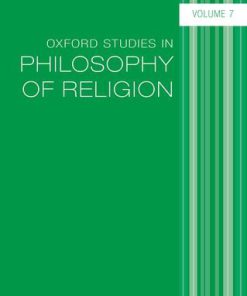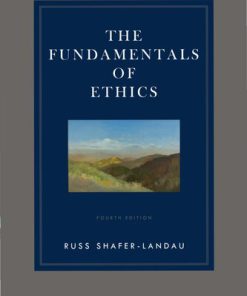Oxford Studies in Metaethics 12 1st Edition by Russ Shafer Landau ISBN 0198805076 9780198805076
$50.00 Original price was: $50.00.$25.00Current price is: $25.00.
Oxford Studies in Metaethics 12 1st Edition by Russ Shafer-Landau – Ebook PDF Instant Download/Delivery: 0198805076, 978-0198805076
Full download Oxford Studies in Metaethics 12 1st Edition after payment

Product details:
ISBN 10: 0198805076
ISBN 13: 978-0198805076
Author: Russ Shafer-Landau
Oxford Studies in Metaethics 12 1st Table of contents:
1. Locating Morality: Moral Imperatives as Bodily Imperatives
- 1.1 Claims of the Body
Examining how moral imperatives relate to bodily experiences. - 1.2 Queer Metaethical Theory
Introduction to queer metaethics and its relationship to moral theory. - 1.3 Conclusion: Queering the Subject?
Reflection on how queer theory challenges traditional moral subjectivity.
2. Difficult Cases and the Epistemic Justification of Moral Belief
- 2.1 Difficult Moral Cases
Discussing moral dilemmas and their complexity in ethical reasoning. - 2.2 Objections and Replies
Addressing objections to the epistemic justification of moral beliefs. - 2.3 Consequences for Moral Epistemology and Moral Metaphysics
Analyzing the impact on moral epistemology and metaphysics.
3. Moral Testimony: Going on the Offensive
- 3.1 to 3.7
Exploring moral testimony, the challenges, and responses in moral discourse.
4. Non-naturalism and Normative Necessities
- 4.1 Non-naturalism and the Supervenience Objection
Discussing the objection against non-naturalism through supervenience. - 4.2 Fundamentalist Non-naturalism
Examining a fundamentalist approach to non-naturalism. - 4.3 Grounded Non-naturalism
Exploring grounded non-naturalism as an alternative. - 4.4 Essentially Grounded Non-naturalism
Further exploration of the essence of grounded non-naturalism. - 4.5 Avoiding Bruteness Revenge
Addressing criticisms against non-naturalism, specifically the “bruteness” objection. - 4.6 Conclusion
Wrapping up the discussion on non-naturalism.
5. The Grounding Argument against Non-reductive Moral Realism
- 5.1 The Supervenience Argument
Examining the supervenience argument against non-reductive moral realism. - 5.2 Normative Supervenience
Discussing how normativity supervenes on natural properties. - 5.3 Hyperintensional Differences
Addressing issues related to hyperintensional differences in moral discourse. - 5.4 The Grounding Argument
Presenting the grounding argument against non-reductive moral realism. - 5.5 Interlude on Reduction
A brief exploration of reduction in the context of moral realism. - 5.6 Normative Grounding
Examining how moral facts may be grounded. - 5.7 Amalgamating Normative Grounds
Exploring the synthesis of multiple normative grounds. - 5.8 Conditional Normative Grounds
Analyzing conditionality in moral grounding. - 5.9 Ethical Idlers?
Investigating cases where ethical grounding may seem non-essential. - 5.10 Conclusion
Concluding thoughts on the grounding argument.
6. What is a Moral Law?
- 6.1 The Grounding Problem in Metaethics
Discussing the grounding problem within metaethical theory. - 6.2 Normative Grounding
Deepening the discussion on the nature of normative grounding. - 6.3 Bridge-law Non-naturalism
Introducing bridge-law non-naturalism as a solution. - 6.4 What is a Moral Law?
Defining moral laws and their nature. - 6.5 Normative Necessity
Discussing what makes moral laws necessary. - 6.6 When is a Moral Law?
Investigating the conditions under which a moral law applies. - 6.7 Why the Question Needs an Answer
Explaining the importance of answering the question of moral laws. - 6.8 A Preliminary Answer
Offering a preliminary definition of moral laws. - 6.9 A Better Proposal?
Proposing alternatives to the initial definition. - 6.10 A Comparison
Comparing different proposals. - 6.11 A Problem for Proposal 2
Identifying issues with one of the proposals. - 6.12 Solving the Problem
Offering solutions to the problem identified. - 6.13 Conclusion
Wrapping up the discussion on moral laws.
7. Ought to Is: The Puzzle of Moral Science
- 7.1 Introduction
Introducing the moral science puzzle. - 7.2 Barber’s Anti-Realist Strategies
Discussing strategies against realism in moral science. - 7.3 Barber’s Realist-Friendly Approach
Presenting a more realist-friendly approach to moral science. - 7.4 Alternatives that Are Not
Identifying alternatives to realist approaches that don’t hold. - 7.5 Resolving the Puzzle: A Dilemma for Moral Science
Analyzing the dilemma and potential resolutions. - 7.6 Conclusion
Concluding thoughts on the puzzle of moral science.
8. Disagreement Lost and Found
- 8.1 The Case Against MLD
Presenting arguments against moral disagreement (MLD). - 8.2 The Case Against QED
Discussing objections to the QED (Quick Explanation of Disagreement) theory.
9. Normative Language in Context
- 9.1 Introduction
Introducing the role of context in normative language. - 9.2 Contextualism and Discourse Disagreement
Exploring contextualism in moral discourse. - 9.3 Managing the Context: Toward Discourse Contextualism
Proposing ways to manage context in moral discussions. - 9.4 Deontic Modals in Discourse: The Basic Account
Discussing the role of deontic modals in moral discourse. - 9.5 Features
Exploring features of normative discourse. - 9.6 Attitude Ascriptions and Normative Thought
Analyzing how attitude ascriptions relate to moral reasoning. - 9.7 Normative Truth
Addressing the nature of normative truth. - 9.8 Conclusion
Concluding thoughts on normative language.
10. On Leaving Room for Doubt: Using Frege–Geach to Illuminate Expressivism’s Problem with Objectivity
- 10.1 Leaving Room for Doubt
Introducing the Frege–Geach problem in expressivism. - 10.2 The No Normative Exhaustion Thesis
Examining the thesis about normative exhaustion. - 10.3 The Negation Problem
Discussing the issues with negating expressivist claims. - 10.4 Accommodating Not Exhaustive: Strategy One
Presenting a strategy to address expressivism’s problems. - 10.5 Accommodating Not Exhaustive: Strategy Two
Another strategy for accommodating expressivism’s challenges. - 10.6 Conclusion
Wrapping up the discussion on expressivism and objectivity.
11. Expressivism and Varieties of Normativity
- 11.1 Setting the Stage
Introducing expressivism in the context of normative theory. - 11.2 Expressivism Sans Character
Exploring expressivism without a focus on character. - 11.3 Semantic Expressivism
Examining semantic expressivism and its implications. - 11.4 Meta-semantic Expressivism
Discussing meta-semantic issues in expressivism. - 11.5 The Expressivist’s Dilemma
The core dilemmas facing expressivists. - 11.6 Pragmatic Expressivism
A pragmatic approach to expressivism. - 11.7 Conclusion
Concluding thoughts on expressivism and normativity.
12. The Predicament of Choice: Ralph Wedgwood
- 12.1 Rationality for Finite Thinkers
Examining rational decision-making for finite thinkers. - 12.2 Thinking of Options
Discussing the cognitive process of considering options. - 12.3 Deciding How to Decide?
The dilemma of how to approach decision-making. - 12.4 Is Thinking of More Options Itself Just Another Option?
Exploring whether considering more options complicates the process. - 12.5 The Proposed Solution
Presenting a potential solution to the predicament of choice. - 12.6 Isn’t This Solution Also Excessively Idealized?
Critiquing the proposed solution for idealization. - 12.7 Conclusion
Concluding remarks on the decision-making dilemma.
People also search for Oxford Studies in Metaethics 12 1st :
oxford studies in metaethics volume 19
oxford studies in metaphysics
what does metaethics study
is there a link between applied normative and metaethics
does oxford university have criminology
Tags:
Russ Shafer Landau,Oxford,Studies,Metaethics 12 1st
You may also like…
Politics & Philosophy - General & Miscellaneous Philosophy
Oxford Studies in Normative Ethics Volume 13 1st Edition by Mark Timmons 0198895923 9780198895923
History
Oxford Studies in Ancient Philosophy Volume 49 1st Edition by Brad Inwood 9780191066412 0191066419
Politics & Philosophy - Anthropology
Politics & Philosophy - Anthropology
Oxford studies in metaethics. Volume 11 1st Edition Shafer-Landau
Religion & Spirituality - Other Religions
Oxford studies in philosophy of religion (Vol.7) 1st Edition Kvanvig
Politics & Philosophy - Social Sciences
Politics & Philosophy - Social Sciences
Politics & Philosophy - Ancient & Medieval Philosophy
The Oxford Handbook of Meaning in Life Oxford Handbooks 1st Edition Iddo Landau
Politics & Philosophy - Anthropology
The Fundamentals of Ethics 4th Edition by Russ Shafer Landau ISBN 0190631392 9780190631390












